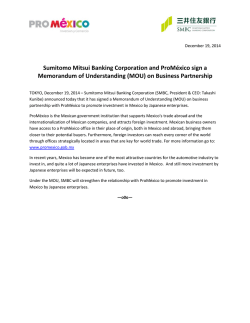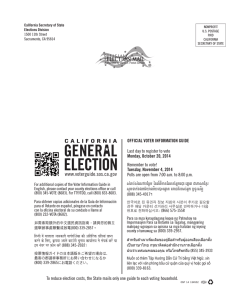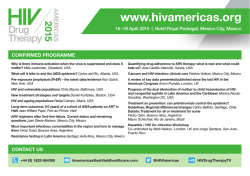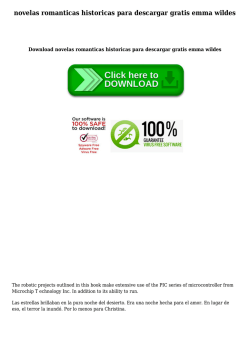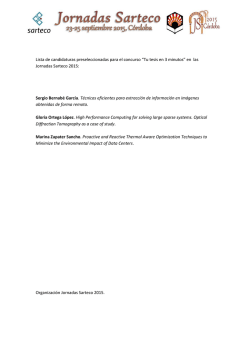
Dr. Jim Yong Kim President World Bank Group May 11, 2016 Ref
May 11, 2016 Dr. Jim Yong Kim President World Bank Group Ref: Statements on April 6th, at the Union Theological Seminary in New York on “the Principle of Mercy” Dear Dr. Kim, We, the 313 undersigned organizations and 31 individuals wish to express our rejection of your statements made on April 6th, at the end of your speech at Union Theological Seminary in New York. As seen in a video made public when responding to a question about the impacts of large dam projects as illustrated by the murder of Berta Cáceres in Honduras, you state, among other things, that “you cannot do the work we‟re trying to do and not have some of these „incidents‟ happen.” Regarding your unfortunate response, we would like to clarify the following: 1. According to the World Bank‟s internal policy, the Bank and other financial institutions must ensure respect of human rights in the projects they finance.1 Claims concerning these kinds of violations, should be addressed with utmost seriousness, in order to prevent, investigate, and when necessary sanction and provide reparations for such violations, ensuring that measures be adopted so that they never occur again. The respect for human life is not a political issue. 2. The murder of Berta Cáceres is a brutal and unacceptable act, which cannot be considered an “incident.” Since 2009 Berta Cáceres was a beneficiary of precautionary measures issued by the Inter-American Commission on Human Rights (IACHR), in order to protect her life and personal integrity.2 In recent years, she was victim of threats and harassment due to her efforts to defend the Lenca territory from the Agua Zarca hydroelectric project. In fact, thanks to her complaints the World Bank and Chinese investors withdrew from the project in 2014. However, Honduran authorities did not implement the necessary actions to address the problems exposed by Berta. If these problems had been adequately addressed by the Honduran authorities, her murder could have been prevented. 3. In your statements you suggest that hydroelectric energy is the only alternative to coal and other controversial sources of energy. But this is not the case. Thanks to technological advances, many alternatives to thermoelectric, nuclear and 1 See for example Operating Policy OP 4.10 of the World Bank concerning Indigenous Peoples, which begins with “This policy contributes to the Bank's mission of poverty reduction and sustainable development by ensuring that the development process fully respects the dignity, human rights, economies, and cultures of Indigenous Peoples.” 2 As a result of the coup d‟etat which occurred on June 28 th, 2009, in Honduras, the Inter-American Commission on Human Rights authorized numerous precautionary measures for persons at risk, in a collective measure MC 196-09. Berta Cáceres was among those protected by these measures. Later, on July 31st, 2013, the Commission separated these measures, maintaining Berta‟s case under the number MC 405-09. Resolution is available at: http://www.cidh.org/medidas/2009.sp.htm. 1 Letter to President Kim Ref. to Berta Caceres and dams, May 11, 2016 hydroelectric energy are being successfully implemented all over the world. This is evidenced in the recent report Global Trends in Renewable Energy Investment 2016, for which you authored the prologue, which explains that in 2015 the world increased its production of wind energy by 62 GW, solar energy by 56 GW, while only 22 GW of capacity was added from large dams.3 We consider that governments and financial institutions that decide on the projects linked to energy generation must apply evaluation procedures that contemplate the various options available, weighing the social benefit or costs for the communities that inhabit the places where these projects are to be implemented, and ensuring that their rights are respected. Until now, this analysis has been vastly inadequate. 4. Regarding the impacts caused by large dams, you mentioned that the people relocated due to these projects could end up in a situation that is “as good as or better than the situation they were in”, but experience has shown that this is not the case. Large dams financed by the World Bank have not served the interest of the poor, rather very much to the contrary.4 The World Commission on Dams itself stated in 2000 that the “poor, vulnerable groups and future generations are likely to bear a disproportionate share of the social and environmental costs of large dam projects without gaining a commensurate share of the economic benefits”.5 It should be recalled also that, due to public pressure associated with its impacts, the World Bank stopped financing large dams in the mid-90s. However, in the 2010s a renewed and frenetic support of these enormous infrastructure projects took place. Even with a renewed attitude, the majority of the benefits from the construction of large dams continue to be for large companies, to the detriment of the interests of communities and people who they were supposedly designed to benefit. This was demonstrated once more with the abhorrent murder of Berta Cáceres. As you pointed out in your speech, “climate change is a terrible and horrible situation.” Faced with this new challenge, we must focus on sources of energy that are gentle to our environment and to the people who depend on it. These sources exist and are available. The World Bank, as a global organization at the service of those who are most in need, has the duty to lead and be part of the change. 3 Frankfurt School FS-UNEP Collaboration Centre for Climate & Sustainable Energy Finance. Global Trends in Renewable Energy Investment 2016. UNEP and Bloomberg New Energy Finance. 2016. 4 For example, today 5,000 people displaced by the Kandadji Dam in Niger lack basic services such as access to drinking water. It appears that there is no sufficient land to relocate the more than 30,000 additional people that the project will displace once it is complete. For more information watch documentary "Kandadji: Lessons learnt from the resettlement of local population" produced by the National Coordination of Users of the Niger Basin (Niger-CNU) and the private television channel Canal 3 Niger. Available at: http://www.gwiwestafrica.org/en/kandadji-resettlement-populations-lessons-learned. Another example is the Nam Theun 2 Hydroelectric Project, which displaced approximately 6,200 indigenous people who lived in the Nakai Plateau and negatively impacted 110,000 people downstream. The impacts include destruction of fisheries, flooding of riverine lands and water quality problems. This case lead Thayer Scudder, a member of the project‟s International Panel of Experts to state publicly in 2014 in the New York Times that “Nam Theun 2 confirmed my longstanding suspicion that the task of building a large dam is just too complex and too damaging to priceless natural resources.” Article available at: http://www.nytimes.com/2014/08/24/opinion/sunday/large-dams-just-arent-worth-thecost.html?_r=2 These are only two of the many examples of cases in which relocated people have had their livelihoods negatively and irreversibly affected. 5 World Commission on Dams. Dams and Development: A New Framework for Decision-Making. Earthscan Publications Ltd, London and Sterling, VA. 2000. Letter to President Kim Ref. to Berta Caceres and dams, May 11, 2016 As organizations working tirelessly to stop human rights violations and harm to the environment, we reject your assessment of the murder of leader Berta Cáceres and we demand that you correct your statements. Furthermore, we urge you to apologize to Berta Cáceres‟ family and to the community of civil society organizations, human rights defenders, indigenous, afro-descendant, and rural communities, among others, that have been affected by your statements. We thank you beforehand for your attention to this urgent matter and we await your response. Sincerely, 1. 2. 3. 4. 5. 6. 7. 8. 9. 10. 11. 12. 13. 14. 15. 16. 17. 18. 19. 20. 21. 22. 23. 24. 25. 26. 27. 28. 29. 30. Abogadas y Abogados para la Justicia y los Derechos Humanos, A.C. Acción por la Biodiversidad Accountability Counsel ACI PARTICIPA ActionAid USA Adapt-Chile Ágora Espacio Civil Paraguay ALDEMA-MADRIZ-NICARAGUA Alianza Ambiental Unidos por Panamá Alianza Global para Alternativas a la Incineración (Global Alliance for Incineration Alternatives-GAIA) Alianza Latinoamericana frente al Fracking Alianza Mexicana contra el Fracking - México Alianza para la Conservación y el Desarrollo (ACD) Altamaha Riverkeeper Alyansa Tigil Mina (Alliance Against Mining-Philippines) Amazon Watch Ambiente, Desarrollo y Capacitación SDRL Amigos da Terra Brasil Amigos de la Tierra España Apalachicola Riverkeeper Appleton Foundation APRODEH Articulación Feminista Marcosur Asamblea de Pueblos Indígenas del Istmo de Tehuantepec en Defensa de la Tierra y el Territorio Asamblea Veracruzana de Iniciativas y Defensa Ambiental Asia Indigenous Peoples Pact (AIPP) Asociación Ambiente y Sociedad Asociación CEIBA - Amigos de la Tierra Guatemala Asociación Ecológica Santo Tomás A.C. Asociación Ecopacifista Verdegaia Mexico Argentina United States Honduras United States Chile Paraguay Nicaragua Panama International Latin America Mexico Panama United States Philippines United States Honduras Brazil Spain United States United States Peru Uruguay Mexico Mexico Asia Colombia Guatemala Mexico Spain Letter to President Kim Ref. to Berta Caceres and dams, May 11, 2016 31. 32. 33. 34. 35. 36. 37. 38. 39. 40. 41. 42. 43. 44. 45. 46. 47. 48. 49. 50. 51. 52. 53. 54. 55. 56. 57. 58. 59. 60. 61. 62. 63. 64. 65. 66. Asociación Interamericana para la Defensa del Ambiente (AIDA) Latin America Asociación Italia Nicaragua Nicaragua Asociación Otros Mundos Colombia Colombia Asociación para el Desarrollo Municipal (ADM) Nicaragua Asociación Voces Nuestras, Centro de Comunicación Educativa Costa Rica Associação de Defesa do Meio Ambiente de Araucária (AMAR) Brazil Associação de Proteção ao Meio Ambiente de Cianorte (APROMAC Brazil ) Associação Juízes para a Democracia (AJD) Brazil Associação Juízes para a Democracia (AJD) Brazil Association Green Alternative Georgia ATTAC Argentina Bank Information Center United States Bantay Kita Philippines Philippines Bargny Coast Waterkeeper Senegal Biofuelwatch United States, United Kingdom Bios Iguana A.C. Mexico Bios Iguana AC Mexico Black Warrior Riverkeeper United States Blue Planet Project International Both ENDS Netherlands Bread for all, Switzerland Switzerland Buliisa Initiative for Rural Development Organisation (BIRUDO) Uganda Business & Human Rights Resource Centre (B&HRRC)/ Centro de Mexico Información sobre Empresas y Derechos Humanos (CIEDH) Cape Fear Riverkeeper United States Censat Agua Viva-Amigos de la Tierra Colombia Colombia Centar za zivotnu sredinu/FoE Bosnia and Herzegovin Bosnia and Herzegovina Center for International Environmental Law (CIEL) International Center for Justice and International Law (CEJIL) Latin America Centre for Environmental Rights South Africa Centro Cultural Malayerba Honduras Centro de Acción para el Desarrollo A.C. Mexico Centro de Apoyo Solidario, Documentación y Estudio, A.C. Mexico Centro de Derechos Humanos de la Montaña "Tlachinollan" Mexico Centro de Derechos Humanos de las Mujeres (CEDEHM) de Mexico Chihuahua, México Centro de Derechos Humanos Fray Bartolomé de Las Casas Mexico Centro de Derechos Humanos Fray Francisco de Vitoria, O.P. A.C. Mexico Letter to President Kim Ref. to Berta Caceres and dams, May 11, 2016 67. 68. 69. 70. 71. 72. 73. 74. 75. 76. 77. 78. 79. 80. 81. 82. 83. 84. 85. 86. 87. 88. 89. 90. 91. 92. 93. 94. 95. 96. 97. 98. 99. 100. 101. 102. 103. Centro de Documentación en Derechos Humanos “Segundo Montes Mozo S.J.” (CSMM) Centro de Estudios para el Desarrollo Rural (CESDER) Centro de Estudios y Acción por la Igualdad Centro de Informacion y Servicios de Asesoria en Salud (CISAS) Centro de Iniciativas en Políticas Ambientales Centro de Investigación y Acompañamiento a las Mujeres y la Familia (CIAMF) Centro de los Derechos del Campesino Centro de Prevención de la Violencia (CEPREV) Centro di Iniziative per la Verità e la Giustizia (CIVG) Centro Memorial Dr. Martin Luther King, Jr. Centro Mexicano de Derecho Ambiental (CEMDA) Centro Nicaraguense de Derechos Humanos (CENIDH) Centro de Militares para la Democracia Argentina (CEMIDA) Ciudadanos en Apoyo a los Derechos Humanos, A.C. Coalición de Tendencias Clasista (CTC-VZLA) Coalición Internacional para el Hábitat, Oficina para América Latina (HIC-AL) Coalición Mexicana por el Derecho al Agua (COMDA) Coalition of the Flemish North-South Movement COFAVIC Colectivo Defensa Verde Naturaleza para Siempre, Veracruz. Colectivo Editorial Crisis A.C. Colectivo Educación para la Paz y los Derechos Humanos A.C. Colectivo por la Igualdad Colectivo Revuelta Verde Colectivo Utopía Puebla Colectivo Voces Ecológicas (COVEC) Colettivo Italia Centro America Collective Voices for Peace Comisión de Derechos Humanos de Guatemala/ Guatemalan Human Rights Commission (GHRC) Comisión Ecuménica de Derechos Humanos (CEDHU) Comisión Mexicana de Defensa y Promoción de los Derechos Humanos A.C. (CMDPDH) Comité Ambiental en Defensa de la Vida Comité Ambientalista Valle de Siria Comité Articulador de Cooperativas de Vivienda por Ayuda Mutua (CACVAM ) Comité Ciudadano por un Veracruz limpio A.C. Comité de América Latina y el Caribe para la Defensa de los Derechos de las Mujeres (CLADEM) Comité de Solidaridad con América Latina de Asturias (COSAL) Ecuador Mexico Argentina Nicaragua Nicaragua Dominican Republic Nicaragua Nicaragua Italy Cuba Mexico Nicaragua Argentina Mexico Venezuela Latin America Mexico Belguim Venezuela Mexico Argentina Mexico Argentina Mexico Mexico Panama Italy United States United States Ecuador Mexico Colombia Honduras Bolivia Mexico Peru Spain Letter to President Kim Ref. to Berta Caceres and dams, May 11, 2016 104. 105. 106. 107. 108. 109. 110. 111. 112. 113. 114. 115. 116. 117. 118. 119. 120. 121. 122. 123. 124. 125. 126. 127. 128. 129. 130. 131. 132. 133. 134. 135. 136. 137. 138. 139. 140. Comité por la Abolición de las Deudas Ilegítimas (CADTM) Comité por la Libre Expresión (C-Libre) Comité Regional de Promoción de Salud Comunitaria (CRPSC) Confederación General del Trabajo (CGT) Consejo de Pueblos de Tezulutlán (CPT) Consejo de Pueblos Wuxhtaj Consejo Tiyat Tlali en Defensa del Territorio Sierra Norte de Puebla Cooperación Comunitaria Cooperativa de Vivienda Fuerza, Unión, Destreza y Ayuda Mutua (COOVIFUDAM R.L.) Coordinadora Centroamericana Autogestionaria de la Vivienda Solidaria (COCEAVIS) Coordinadora Civil Coordinadora de Afectados por Grandes Embalses y Trasvases (COAGRET) Consejo Cívico de Organizaciones Populares e Indígenas de Honduras (COPINH) Corporación Humanas Centro Regional de Derechos Humanos y Justicia de Género Corporación Privada para el Desarrollo de Aysén Corporación Sisma Mujer Cotidiano Mujer Council of Canadians Crude Accountability Crystal Coast Waterkeeper Defensa de Niñas y Niños Derecho, Ambiente y Recursos Naturales (DAR) Dialogo 2000 Jubileo Sur Argentina Diverse Voices and Action (DIVA) for Equality Due Process of Law Foundation (DPFL) Argentina Honduras Mesoamerica Spain Guatemala Guatemala Mexico Mexico Costa Rica Central America Nicaragua Spain Honduras Chile Chile Colombia Uruguay Canada United States United States International Peru Argentina Fiji Latin America ECODESS Peru Ecologistas en Acción Spain Emerald Coastkeeper, Inc. United States Environmental Investigation Agency United States Equipo de Educación Popular Pañuelos en Rebeldía Argentina Equipo de Reflexión, Investigación y Comunicación de la Compañía Honduras de Jesús Espacio Público Venezuela FASE/ES Brazil Federación de Tierra, Vivienda y Hábitat (FTV) Argentina Federación Ecologista Costa Rica (FECON) Costa Rica FIAN Mexico FIDH, dentro del Observatorio para la Protección de los Defensores France de Derechos Humanos Letter to President Kim Ref. to Berta Caceres and dams, May 11, 2016 141. Food and Water Watch 142. Fondo de Acción Urgente para América Latina y el Caribe 143. Foro Ciudadano de Participación por la Justicia y los Derechos Humanos (FOCO) 144. Foro Honduras Suiza 145. Fórum Brasileiro de ONGs e Movimentos Sociais para o Meio Ambiente e o Desenvolvimento Sustentável (FBOMS) 146. Foundation for GAIA 147. 148. 149. 150. 151. 152. 153. 154. 155. 156. 157. 158. 159. 160. 161. 162. 163. 164. 165. 166. 167. 168. 169. 170. 171. 172. 173. 174. 175. 176. 177. 178. 179. Franciscans International Frente de Comunidades en Contra de la Incineración Saludos Frente Nacional por la Vida y la Soberanía Friends of the Earth Canada Friends of the Earth International (FoEI) Friends of the Earth US Friends of the Siberian Forests Front Line Defenders Fronteras Comunes Fundación Ambiente y Recursos Naturales (FARN) Fundación de Estudios para la Aplicación del Derecho Fundación Decide Fundación Heinrich Böll - Oficina Regional para México Centroamérica y el Caribe Fundación M´Biguá, Ciudadanía y Justicia Ambiental Fundación Nicaragua (FUNDENIC - SOS) Fundación Popol Na FUNDAR, Centro de Análisis e Investigación FUNDEPS Futaleufu Riverkeeper Gender Action GRAIN Grand Riverkeeper Labrador, Inc. Grassroots International Greenpeace Grupo de Financiamiento Climático para América Latina y el Caribe (GFLAC) - regional Grupo de Mujeres de San Cristobal Las Casas A.C. Grupo Ecológico Manglar, A.C. Grupo Guayubira Grupo Venancia Guayllabamba Waterkeeper Haus of Khameleon Himalayan Glacier Waterkeeper Honduran Conservation Coalition/ Coalición para la Conservación United States Colombia Argentina Honduras Brazil United Kingdom International Mexico Peru Canada International United States Russia International Mexico Argentina El Salvador Chile Mexico Argentina Nicaragua Nicaragua Mexico Argentina Chile United States Spain Canada United States International Latin America Mexico Mexico Uruguay Nicaragua Ecuador Fiji India Honduras Letter to President Kim Ref. to Berta Caceres and dams, May 11, 2016 180. 181. 182. 183. 184. 185. 186. 187. 188. 189. 190. 191. 192. 193. 194. 195. 196. 197. 198. 199. 200. 201. 202. 203. 204. 205. 206. 207. 208. 209. 210. 211. 212. 213. 214. 215. 216. 217. 218. Hondureña Hudson Riverkeeper Human Rights Committee for Colombia in Hurricane Creekkeeper Incidencia de la Asociación "Agentes de Cambio" - Marimba Inclusive Development International Ingo Conference of the Council of Europe HR Committee Working Group "Human Rights, Codevelopment & Migrations" Iniciativa para las Inversiones Sustentables China-América Latina Institute for Agriculture and Trade Policy (IATP) Institute for Policy Studies, Global Economy Project & Climate Policy Program Instituto de Estudios Comparados en Ciencias Penales Instituto Internacional de Derecho y Sociedad -IIDS Instituto Latinoamericano para una sociedad y un derecho alternativos, ILSA con sede en Bogotá Instituto Mexicano Para el Desarrollo Comunitario, A.C. (IMDEC) Instituto Políticas Alternativas para o Cone Sul (PACS) International Rivers ISMUGUA Jamaa Resource Initiatives Jamaica Environment Trust JASS (Just Associates) JASS Asociadas por lo Justo Jubileo Sur Jubileu Sul Brasil Justiça Global Klimablog Laboratorio de Investigación en Desarrollo Comunitario y Sustentabilidad (LIDECS) Labour,Health and Human Rights Development Centre L'Asociaciòn Nacional Italia Nicaragua Latin American-Canadian Solidarity Association (LACASA) Lower Mississippi Riverkeeper Magdalena Baykeeper Makxtum Kgalhaw Chuchutsipi Mangrove Action Project Maryknoll Office for Global Concerns Maule Itata Coastkeeper, Waterkeeper Chile Membership groups of Publish What You Pay Spain Middle Susquehanna Riverkeeper Association, Inc. Milwaukee Riverkeeper MOFISP Movimento dos Atingidos por Barragens (MAB) United States Germany United States Nicaragua United States International United States United States United States Guatemala Peru Colombia Mexico Brazil International Guatemala Kenya Jamaica Mexico Mesoamerica Peru Brazil Brazil Bolivia Mexico Nigeria Nicaragua Canada United States Mexico Mexico United States International Chile Spain United States United States Bolivia Brazil Letter to President Kim Ref. to Berta Caceres and dams, May 11, 2016 219. 220. 221. 222. 223. 224. Movimento dos Trabalhadores Sem Teto Brasil Movimiento Agrario Indígena Zapatista Movimiento Autónomo de Mujeres Movimiento Colombiano Rios Vivos Movimiento de Mujeres de Chinandega Movimiento Mesoamericano contra el Modelo extractivo Minero (M4) 225. Movimiento Mexicano de Afectados por las Presas y en Defensa de los Ríos (MAPDER) 226. Movimiento Mundial por los Bosques (WRM) 227. Movimiento para la Salud de los Pueblos (MSP-LA) 228. 229. 230. 231. 232. 233. 234. 235. 236. 237. 238. 239. 240. 241. 242. 243. 244. 245. 246. 247. 248. 249. 250. 251. 252. 253. 254. 255. 256. Mujer y Medio Ambiente, A.C. Narasha Community Development Group Nicoya Peninsula Waterkeeper Observatorio de Expansión Minero-energética y Re-existencias Organización Mundial Contra la Tortura (OMCT), dentro del Observatorio para la Protección de los Defensores de Derechos Humanos Organización Tutunaku Nahua en Defensa del Territorio Otros Mundos A.C.- Amigos de la Tierra México Pacto de Grupos Ecogistas PAPDA Para Leer en Libertad A.C. Partida de la Refundación Comunista-Izquierda Europea Paz y Esperanza People for Peace Philippine Movement for Climate Justice (PMCJ) Plataforma Interamericana de Derechos Humanos, Democracia y Desarrollo (PIDHDD Regional) Plataforma Internacional contra la Impunidad (Pi) Plataforma pola defensa de Corcoesto e Bergantiños Polo Ciudadano Potomac Riverkeeper Network Procesos Integrales para la Autogestión de los Pueblos Programa Chile Sustentable Programa Feminist Centroamericano La Corriente Programa Restauración de Tortugas Marinas (PRETOMA) Promotora de Servicios para el Desarrollo S.C Public Services International Puget Soundkeeper Purple Action for Indigenous Women's Rights (LILAK) RealChile RealPeru Brazil Mexico Nicaragua Colombia Nicaragua Mesoamerica Mexico International Latin America Mexico Kenya Costa Rica Colombia France Mexico Mexico Mexico Haiti Mexico Italy Peru International Philippines Ecuador Guatemala Spain Panama United States Mexico Chile Nicaragua Costa Rica Mexico France United States Philippines Chile Peru Letter to President Kim Ref. to Berta Caceres and dams, May 11, 2016 257. Red de Acción por el Agua - México/ Freshwater Action Network Mexico 258. Red de Ambientalistas Comunitarios de El salvador RACDES 259. Red de Mujeres de Matagalpa 260. Red de Mujeres del Norte "Ana Lucila" 261. Red de Organizaciones de Managua 262. Red Latinoamericana Contra Los Monocultivos de Árboles (RECOMA) 263. Red Latinoamericana sobre las Industrias Extractivas (RLIE) regional 264. Red Mexicana de Afectados por la Minería (REMA) 265. Red Nacional para la Defensa del Agua 266. Regional Latinoamericana de la Unión Internacional de Trabajadores de la Alimentación, Agrícolas, Hoteles, Restaurantes, Tabaco y Afines (Rel-UITA) 267. Rights Action Mexico El Salvador Nicaragua Nicaragua Nicaragua Latin America Latin America Mexico Panama Latin America 268. 269. 270. 271. 272. 273. 274. 275. 276. 277. 278. 279. 280. 281. 282. 283. 284. 285. 286. 287. 288. United States, Canada Peru Peru Spain United States United States Paraguay Guatemala Argentina Nicaragua Mexico Mexico United States United States Mexico Canada Canada Spain Netherlands Chile Sri Lanka Mexico 291. The International Network on Displacement and Resettlement 292. The Oakland Institute Bolivia United Kingdom United States United States Río Mapacho Waterkeeper Río Marañón Waterkeeper Salva la Selva Santa Clara University - International Human Rights Clinic Savannah Riverkeeper Sector Sindical Seguridad en Democracia (SEDEM) Servicio Habitacional y de Acción Social Servicios Integrales para la Mujer (SI Mujer) Servicios para una Educación Alternativa, A.C. EDUCA Servicios y Asesoría para la Paz A.C. (SERAPAZ) Severn Riverkeeper Shenandoah Riverkeeper Sicsal México Sierra Club Canada Foundation Social Justice Connection Sol de Paz Pachakuti SOMO SUR Corporación de Estudios Sociales y Educación Swarna Hansa Foundation The Assembly of Indigenous Peoples of the Isthmus in Defense of Land and Territory (APIIDTyT) 289. The Democracy Center 290. The Editorial Board of Alternautas Letter to President Kim Ref. to Berta Caceres and dams, May 11, 2016 293. The Woodland League 294. TOXISPHERA Associação de Saúde Ambiental 295. Tri-People Concern for Peace, Progress and Development of Mindanao(TRICOM), Inc. 296. Unidad de Protección a Defensoras y Defensores de Derechos Humanos 297. Unidad Indigena Totonaca Nahuatl 298. Unión de Afectados por Texaco (UDAPT) 299. Unión Popular Valle Gómez A. C. 300. Universidad de la Tierra en Puebla 301. Universidad de la Tierra en Tehuiloyocan 302. Upper Potomac Riverkeeper 303. Urgewald 304. Venezuela Diversa A.C. 305. Visayas State University 306. Wabash Riverkeeper 307. Washington Office on Latin America (WOLA) 308. Waterkeeper Alliance, Inc. 309. Waterkeeper Río Grijalva 310. Waterkeepers Chesapeake 311. WECF International 312. White Oak-New Riverkeeper 313. WITNESS 314. Women's Environment and Development Organization (WEDO) 315. XminY hét actiefonds 316. Yadkin Riverkeeper Ireland Brazil Philippines Guatemala Mexico Ecuador Mexico Mexico Mexico United States Germany Venezuela Philippines United States United States International Mexico United States Europe United States United States United States Netherlands United States Individuals: 1. 2. 3. 4. 5. 6. 7. 8. 9. 10. 11. 12. 13. 14. 15. Barry Gills Aída Quiñones Torres Alejandro Dausá Alessandro Bellucci e Paola Vittori Andrea Margarita Del Carmen Pedro Arrojo Agudo Bertha Elena Munguía Gil Brenda Consuelo Pedro Luis Cazes Camarero Diana McCaulay Fred Kelly Lucía Gorricho Julio Fierro Morales Hanne Cottyn - Gent Hildelisa Preciado Finland Colombia Bolivia Italy Nicaragua Spain Mexico Nicaragua Argentina Jamaica United States Argentina Colombia Belgium Mexico Letter to President Kim Ref. to Berta Caceres and dams, May 11, 2016 16. 17. 18. 19. 20. 21. 22. 23. 24. 25. 26. 27. 28. 29. 30. 31. Isabela Orellana Ramírez Ismael Moreno Jorge Varela Márquez Clara Meyra Segura Karla Lara María López Vigil Maxime Combes Andrés Cabanas Octavio Erick Quesnel Galván Patrick Bond Alba Luz Deras Rae Schnapp, Ph.D. Ricardo Navarro Rocío Silva Santisteban Manrique Silvia Rodriguez Cervantes Alexander Main Honduras Honduras Honduras Mexico Nicaragua France Guatemala Mexico South Africa United States El Salvador Peru Costa Rica United States
© Copyright 2026
